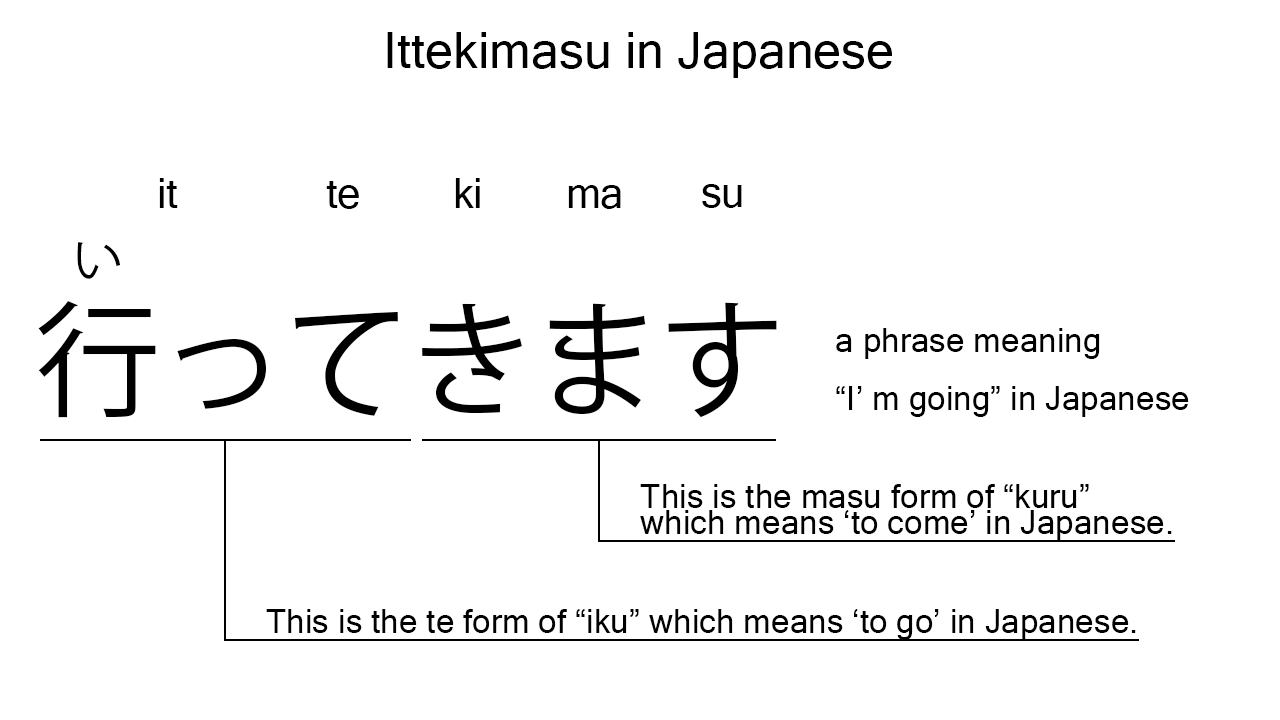What does “ittekimasu” mean in Japanese?
English doesn’t have a perfect translation for this phrase, I think. Japanese people say “ittekimasu” to announce their departures when they leave their houses. So, this phrase is often translated into English as “I’m going”, “I’m leaving”, or even “see you later”. Perhaps, some Japanese learners know this phrase as it is sometimes used in Japanese textbooks. In this blog post, however, I will explain it in detail based on its grammatical components. And also, I will explain how to use it through an example sentence. My explanations would help Japanese learners understand “ittekimasu” more clearly. Then, let’s get started!
Contents
Definition and meanings of “ittekimasu”
Let me start with the definition and meanings of “ittekimasu”.
- ittekimasu – 行ってきます (いってきます) : a phrase meaning ‘I’m going’, ‘I’m leaving’, ‘see you later’, or such in Japanese.
Again, but Japanese people use this phrase to announce their departures when they leave their houses. Unfortunately English doesn’t have a perfect translation, so I will explain it in detail based on Japanese. Let me explain its grammatical components, one by one.
What does “ittekimasu” literally mean in Japanese?
“Ittekimasu” consists of the following two components:
- itte – 行って (いって) : the te form of the verb, “iku“, which means ‘to go’ in Japanese. It has been conjugated for the better connection with the following word. In Japanese, the te forms of words can make chronological orders. So, this te form can mean ‘go and then’ in Japanese.
- kimasu – きます : the masu form of the verb, “kuru“, which means ‘to come’ in Japanese. In Japanese, the masu forms of verbs can work as their polite forms. So, this masu form means ‘to come’ politely in Japanese.
These two components tell us that “ittekimasu” literally means ‘go and then come’ politely in Japanese. This literal interpretation is completely in line with the actual usage. Actually Japanese people use the phrase not only to announce their departures, but to hope for their future returns as well. So, its literal translation could be “I’m going and will come back safely” or such. Personally, I love this idea very much. It is a kind of promise to come back home safely.

When we meet new Japanese phrases, we should check their components in detail to understand their meanings clearly and deeply. In many cases, grammatical components tell us a lot about the meanings of the phrases they form. Actually, here, we could get the better understanding of “ittekimasu” through the detailed check above.
So far, I’ve explained the definition and meanings of “ittekimasu” together with its grammatical components. Then, let me explain how to use it through the example sentence below.
Example: how to use “ittekimasu”
「ittekimasu」 to it te kanojo wa it ta – 「行ってきます」と言って彼女は行った (「いってきます」といってかのじょはいった)
“I’m going,” she said and went out.
Below are the new words used in the example sentence.
- to – と : a case particle working as a quote marker. In the example, this works after the clause to indicate what she said.
- it – 言っ (いっ) : one conjugation of the verb, “iu“, which means ‘to say’ in Japanese. In the example, it has been conjugated for the better connection with its following word.
- te – て : the same as used in “ittekimasu”. In this example, this is used after “it” to make its te form, “it te”.
- kanojo – 彼女 (かのじょ) : a pronoun meaning ‘she’ in Japanese.
- wa – は : a binding particle working as a case marker or topic marker. In the example, this works after “kanojo” to make the subject in the sentence.
- ta – た : an auxiliary verb used after a verb, adjective, or auxiliary verb to make its past tense form. In the example, this is used after “it” to make its past tense form, “it ta”. This form has been translated as “went out”.
This is a typical usage of “ittekimasu”. When we want to announce our departures in Japanese when we leave our houses, this phrase is a very good option.
Summary
In this blog post, I’ve explained the definition and meanings of “ittekimasu” in detail based on its grammatical components. And also, I’ve explained how to use it through the example sentence. Let me summarize them as follows.
- ittekimasu – 行ってきます (いってきます) : a phrase meaning ‘I’m going’, ‘I’m leaving’, ‘see you later’, or such in Japanese. Japanese people use this phrase to announce their departures when they leave their houses. This phrase literally means ‘go and then come’ politely in Japanese. This literal interpretation is completely in line with the actual usage. Actually Japanese people use the phrase not only to announce their departures, but to hope for their future returns as well. So, its literal translation could be “I’m going and will come back safely” or such. Personally, I love this idea very much. It is a kind of promise to come back home safely.
Hope my explanations are understandable and helpful for Japanese learners.